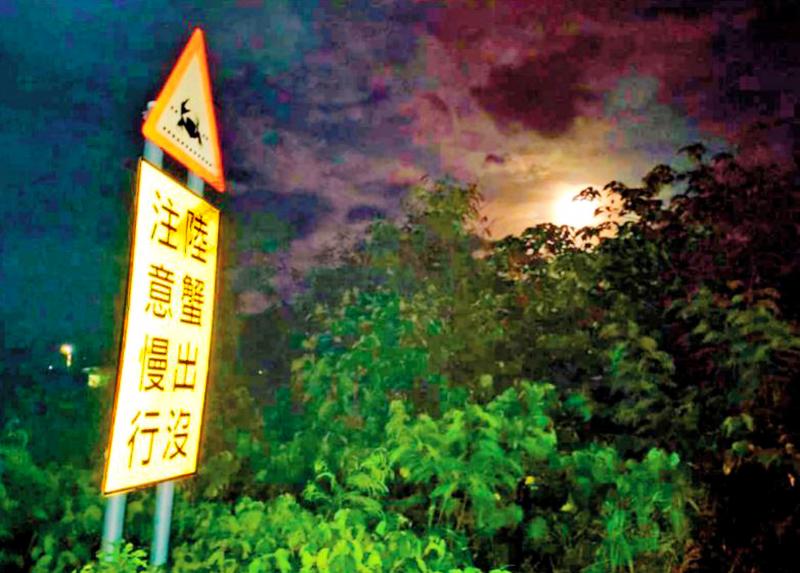Pingtung County environmentalists yesterday called for measures to protect crabs crossing Checheng Coastal Scenic Road in the county’s Checheng Township (車城).
Pingtung County Environmental Protection Union supervisory board member Chu Yu-hsi (朱玉璽) said that numerous crabs dwelling in a nearby wetland are killed by vehicles on a 250m section of the road each year.
The section — which runs north-south along the wetland from Sihchong (四重) creek to Baoli (保力) creek — acts as a barrier to the crabs, which reproduce on land, he said.

Photo: Tsai Tsung-hsien, Taipei Times
Citing roadkill figures gathered by volunteers, Chu said that vehicles run over about 10 female crabs every day during the height of the crustaceans’ breeding season, he said, adding that the death of a female crab could mean the loss of 200,000 eggs.
The most affected species are Cardisoma carnifex, which account for about 80 percent of the wetland’s crab population, along with Tuerkayana hirtipes and hermit crabs, he said.
Kenting National Park has built underground passages and implemented traffic controls around Provincial Highway 26 and a road in Shadao (砂島) reduce crab deaths, he said.
The county could implement the park’s policies to protect the township’s crabs, he said.
A volunteer surnamed Yang (楊) said the scenic road has less traffic than Provincial Highway 26, which means similar policies could be readily adopted.
The Pingtung Department of Agriculture said it would consider implementing the controls along the road, depending on traffic patterns.

GENSLER SURVEY: ‘Economic infrastructure is not enough. A city needs to inspire pride, offer moments of joy and foster a sense of belonging,’ the company said Taipei was named the city with the “highest staying power” in the world by US-based design and architecture firm Gensler. The Taiwanese capital earned the top spot among 65 cities across six continents with 64 percent of Taipei respondents in a survey of 33,000 people saying they wanted to stay in the city. Rounding out the top five were Vietnam’s Ho Chi Minh City (61 percent), Singapore (59 percent), Sydney (58 percent) and Berlin (51 percent). Sixth to 10th place went to Monterrey, Mexico; Munich, Germany; Sao Paulo, Brazil; Vancouver; and Seoul. Cities in the US were ranked separately, with Minneapolis first at

The Japan-Taiwan Exchange Association has cautioned Japanese travelers to be vigilant against pickpockets at several popular tourist spots in Taiwan, including Taipei’s night markets, the Yongkang Street area, Zhongshan MRT Station, and Jiufen (九份) in New Taipei City. The advisory, titled “Recent Development of Concerns,” was posted on the association’s Web site under its safety and emergency report section. It urges travelers to keep backpacks fully zipped and carried in front, with valuables placed at the bottom of the bag. Visitors are advised to be especially mindful of their belongings when taking photos or speaking on the phone, avoid storing wallets and

Scoot announced yesterday that starting in October, it would increase flights between Taipei and Japan’s Narita airport and Hokkaido, and between Singapore and Taipei. The low-cost airline, a subsidiary of Singapore Airlines, also said it would launch flights to Chiang Rai in Thailand, Okinawa and Tokyo’s Haneda airport between December and March next year. Flights between Singapore and Chiang Rai would begin on Jan. 1, with five flights per week operated by an Embraer E190-E2 aircraft, Scoot said. Flights between Singapore and Okinawa would begin on Dec. 15, with three flights per week operated by Airbus A320 aircraft, the airline said. Services between Singapore

ENDORSING TAIWAN: Honduran presidential candidate Nasry Afura said that Honduras was ‘100 times better off’ when it was allied with Taipei The Ministry of Foreign Affairs yesterday said it would explore the possibility of restoring diplomatic relations with Honduras based on the principle of maintaining national interests and dignity. The ministry made the remarks in response to reporters’ questions regarding an article titled: “Will Taiwan Regain a Diplomatic Ally?” published in The Diplomat on Saturday. The article said Honduras’ presidential election in November could offer Taiwan the chance to regain an ally, as multiple candidates have promoted re-establishing diplomatic relations with Taiwan. Honduras severed diplomatic ties with Taiwan in March 2023 in favor of Beijing, but since switching its diplomatic recognition,